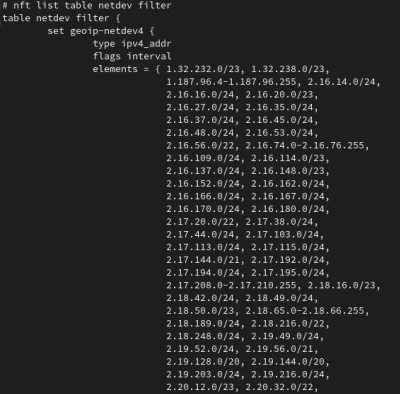
What if you could block connections to your network in real-time from countries around the world such as Russia, China and Brazil where the majority of cyberattacks originate? What if you could redirect connections to a single network based on their origin? As you can imagine, being able to control these things would reduce the number of attack vectors on your network, improving its security. You may be surprised that this is not only possible, but straightforward and easy, by implementing geographic filtering on your nftables firewall with Geolocation for nftables.
Geolocation for nftables is a simple and flexible Bash script released in December of 2020 designed to perform automated real-time filtering using nftables firewalls based on the IP addresses for a particular region. In a recent interview with LinuxSecurity researchers, the project’s lead developer Mike Baxter explained the mission of Geolocation for nftables, “I hope this project is beneficial to those who may not have the IT budget or resources to implement a commercial solution. The code runs well on servers, workstations and low-power systems like Raspberry Pi. The script has the built-in ability to flush and refill geo filtering sets after a database update without restarting the firewall, allowing servers to run uninterrupted without dropping established connections.”
This article will examine the concept of geo filtering and how it could add a valuable layer of security to your firewall, and will then explore how the Geolocation for nftables project is leveraging Open Source to provide intuitive, customizable geo filtering on Linux.
What Is Geo Filtering?
Geo filtering is a firewall technology that filters and blocks both incoming and outgoing network connections based on geographic location using IP addresses. Geo filtering technology enables a computer firewall to compare the source or destination IP address of a network packet to a list of location specific IP address ranges, which can be found in freely available geolocation databases such as db-ip.com. Firewall rules can then determine what to do with each packet - accept, reject, redirect to a server with localized content, drop, or simply count the packet - based on the location of its origin or destination.
How Can Geo Filtering Enhance Firewall Security?
Geographic filtering enables administrators to mitigate threats to their network by blocking IP addresses associated with countries or locations where the majority of cyberattacks originate, or that they have no reason to allow traffic from. If you have no reason to accept incoming online communications from certain countries, then implementing whole-country Geo filtering on your firewall may make sense. However, keep in mind that if you’re using software or online services from other countries, you may have to accept communications from these countries. Cutting off entire countries is quick and effective, but in many cases it makes sense to use more sophisticated IP filtering settings to either block only certain IP addresses, ranges of IPs or lists of IPs known to be malicious, or to create rules in your firewall that make exceptions and allow trusted IP addresses to access your systems.
Geo filtering is a valuable security feature, but does have some limitations. For instance, the technology could potentially block legitimate online traffic, and isn’t able to prevent targeted attacks, as criminals can easily hide their location by using servers or compromised computers in different locations to launch attacks. Implementing Geo filtering on your nftables firewall can add a valuable layer of security to your network by reducing its attack surface and helping to protect against malware and other dangerous, persistent threats - but it should not be viewed as a cybersecurity cure-all. Baxter emphasizes the importance of implementing this technology as part of a comprehensive, defense-in-depth approach to cybersecurity: “Geo filtering is one layer of security that can help to reduce the number of attack vectors on a computer or network, but it’s not a silver bullet. There are ways around every type of computer security, so it’s important to do security in layers.”
Geolocation for nftables Leverages Open-Source Development to Make Filtering by Country Seamless, Easy & Effective
Geolocation for nftables makes implementing real-time geographic filtering on your nftables firewall simple, convenient and effective, while offering granular control over network traffic. The Bash script converts the 400,000 lines of IP address ranges and country codes in its database to a format that Linux nftables firewalls can access with firewall rules. The script automatically generates country-specific nftables address range sets, and automatically determines the installed version of nftables and recommends the correct "include" statements for an administrator’s ruleset. User settings are conveniently stored in a standard configuration file, as opposed to using command line arguments. The geographic database is automatically downloaded from db-ip.com in real-time, keeping nftables Geo Filtering sets up-to-date. This is critical, as the IP address ranges assigned to each country change over time and geographic databases must be updated regularly in order to remain accurate and effective. Geolocation for nftables also has the unique ability to automatically run an nftables script to flush and refill IP sets with new data after a database update, allowing servers to run uninterrupted - without dropping established connections. Geolocation for nftables is an open-source project, and offers users an array of unique benefits that can be attributed to its use of Open Source - namely, enhanced security and a high level of customization. The script is easy to set up, configure and tailor to meet your specific needs with open-source code that is heavily vetted by the community. The “many eyes” reviewing this code on an ongoing basis results in rapid identification and elimination of vulnerabilities and security issues. The global community input that the project receives fosters innovation by offering ideas, feedback and programming expertise. Geolocation for nftables source code is heavily commented on, making it easy to understand and customize. This selection of benefits comes at no cost to the end user as, in the words of Baxter, open-source development is “just people helping people”.
Geolocation for nftables is an open-source project, and offers users an array of unique benefits that can be attributed to its use of Open Source - namely, enhanced security and a high level of customization. The script is easy to set up, configure and tailor to meet your specific needs with open-source code that is heavily vetted by the community. The “many eyes” reviewing this code on an ongoing basis results in rapid identification and elimination of vulnerabilities and security issues. The global community input that the project receives fosters innovation by offering ideas, feedback and programming expertise. Geolocation for nftables source code is heavily commented on, making it easy to understand and customize. This selection of benefits comes at no cost to the end user as, in the words of Baxter, open-source development is “just people helping people”.
Geolocation for nftables seamlessly integrates with other firewall applications by allowing multiple matches per firewall rule, so matches can be combined with matches from other sources to determine how a network packet is handled. For instance, an administrator can accept a packet with an IP address that’s on his or her IP “allow” list, but not on his or her Fail2ban “block” list with a single firewall rule. Geo Filtering for nftables has a small memory footprint and offers flexible configuration, making the script ideal for any system - even those with limited RAM.
Key feature and benefits of Geolocation for nftables include:
- A script written for the widely used Bash shell that automatically generates country-specific nftables address range sets
- Easy to implement, configure and customize with heavily reviewed open-source code
- Small memory footprint and flexible configuration makes the script run well on systems with limited RAM
- User settings are conveniently stored in a standard configuration file rather than using command line arguments
- Packets can be filtered by geography with a single nftables rule rather than two rules to mark and match packets
- Automatically determines your installed version of nftables and recommends the correct "include" statements for your ruleset
- Creates "include-all" files to allow you to include all geographic IP sets with a single reference on older versions of nftables that don't support include wildcards
- Offers a User Guide which explains how to define all element definitions for Geolocation sets in one file, eliminating the chance of having out-of-sync definitions in multiple files when flushing and refilling sets with new data
- Simplified directory structure to shorten "include" path names
- Creates ~500 IPv4 and IPv6 set files from the geographic database in about 10 seconds on a low power quad-core 2200ge server with SSD storage
- Tested on Ubuntu Server, Fedora Server, and Raspberry Pi OS
Key Takeaways
Geographic filtering is a valuable layer of defense that you should consider adding to your nftables firewall to reduce the attack surface on your network and help secure your system against malware and other serious, prevalent threats. Geolocation for nftables provides Linux users with a simple, flexible and automated way to implement real-time geographic filtering on their nftables firewall.
Visit the project’s Github page to learn more about Geolocation for nftables and how you can install the script on your system.
Please reach out to us if you have an open-source security project you would like us to cover in a future LinuxSecurity feature article!
Connect with us on social media:














